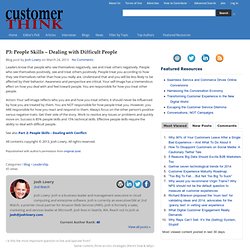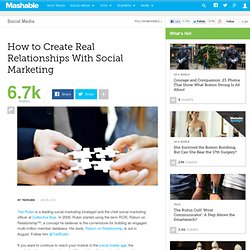

Customers Don't Want Ads, They Want A Conversation. It is becoming clear that the future of social marketing, and marketing in general, will be built around collaboration.

Social technology has already evolved from a focus on consumer listening to broader social management platforms that help brands build and communicate with their consumers. Now, the stage is set for social tech to begin creating real value for companies through deep collaboration with consumers. Collaborative marketing will mean that marketers truly shift from marketing “at” consumers to marketing “with” consumers. We have reached a tipping point where a penalty will be paid by those companies who simply view social as a mass communication channel for blasting out messages to a mass audience. Today, the companies that win are closest to those who buy, use, and advocate for their products.
Two Keys To Be Influential On Twitter. The ability to influence is something that is valued by many.

Sales people succeed or fail by their power to influence and marketers commit companies and brands to multi million dollar budget marketing campaigns hoping to influence buyers to turn up to store or a show and buy products and services. Robert Cialdini previously the Professor of Psychology and Marketing at Arizona State University and the author of the best selling book “Influence: The Psychology of Persuasion” mentions six weapons of influence that he sees as being important in the art and science of influence. 1.
Reciprocity – People tend to return a favor, thus the pervasiveness of free samples in marketing. P1: People Skills – Connecting with Others. You cannot move people to action over the long-term unless you first move them with emotion.

The heart always comes before the head. The stronger you connect with people, the greater your influence becomes with them. P2: People Skills – Dealing with Conflict. When dealing with conflict, leaders do not point fingers or make excuses.

They take 100% accountability for making the relationship work with zero expectation of receiving anything in return. Leaders are committed to being a catalyst for demonstrating and initiating appropriate behavior and positive change. They know that when relationships are left to chance, they will always be subject to misalignment and vulnerability. Always work to understand the other person’s perspective before forming an opinion or making a judgment about them. Action: Know that people are either your adversaries or assets. See also Part 1: People Skills – Connecting with Others All contents copyright © 2013, Josh Lowry. P3: People Skills – Dealing with Difficult People. Leaders know that people who see themselves negatively, see and treat others negatively.

People who see themselves positively, see and treat others positively. I Dare You to Track Your Time. I dare you to write down everything you do and the amount of time you spend doing it for three days.

I dare you to start tracking every activity from the moment you get up in the morning (including the time you get up) until the time you go to bed for 72 straight hours. I dare you to track how much time you spend in your email inbox. In fact, I double dog dare you. I dare you to track how much time you spend surfing the web, and sitting on social media sites. I dare you to track how much time you spend on unscheduled, informal, unnecessary, or slightly amusing conversations with your peers. I dare you to write down exactly how much time you spent over these three days working on the biggest most important projects or goals in your life.
I dare you to track the time you spent doing proactive, meaningful, value creating work over a 72-hour period. Most of what is urgent is important. Questions Where do you invest most of your time? Who is missing from this list? Comments. How to Create Real Relationships With Social Marketing. Ted Rubin is a leading social marketing strategist and the chief social marketing officer at Collective Bias.

In 2009, Rubin started using the term ROR, Return on Relationship™, a concept he believes is the cornerstone for building an engaged multi-million member database. His book, Return on Relationship, is out in August. Follow him @TedRubin. If you want to continue to reach your market in the social media age, the marketing focus needs to be on building relationships, and metrics need to expand beyond ROI. In fact, ROI is simple dollars and cents. Don’t Just Act Authentic This might seem obvious, but authenticity is on the verge of becoming just another buzz word in social media marketing. The only way to be authentic is to be authentic. Be Real to Create Trust We are hearing so much now about social media creating a shift from ‘the wisdom of crowds'’ to ‘the wisdom of friends'’, but what does that really mean for brand advocacy?
Take Care of Your Advocates Be an Actual Friend.